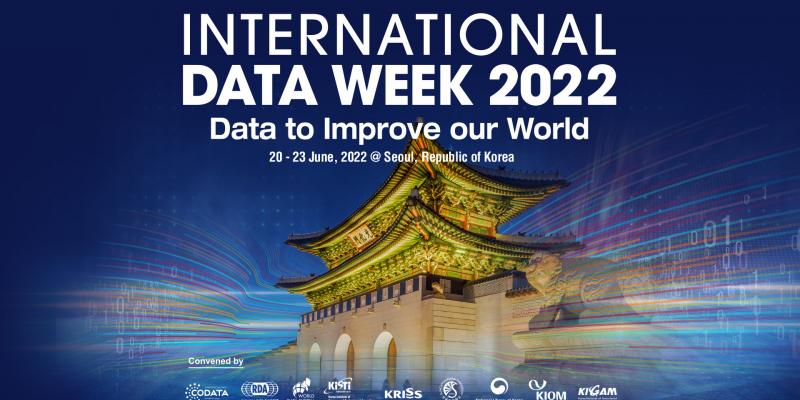
The EOSC Finnish Forum sponsored four of its members the registration to the 18th Research Data Alliance (RDA) Plenary that was organised virtually 3-11 November 2021. For three of the open call awardees, this was the first time when they participated RDA Plenary and for the one with previous experience, it proved again the power of the like-minded experts working together across the globe for open sharing and re-use of data.
The awardees attended several interesting sessions ranging from the standardization and implementation of the data policy to the environmental impact of data and many more. Read below about their experiences and what they brought back from the plenary to their work.
- Egle Gedrimiene, PhD student and Research Data Management Specialist, University of Oulu
- Elina Mäntylä, Development Specialist, University of Turku
- Jari Friman, Librarian and Data Support Specialist, Tampere University
- Laura Niemi, Development Specialist, University of Turku
Read also the blog by Iina Hepolehto, Science Information Specialist, University of Helsinki, who participated in the previous RDA Plenary (RDA P17) in spring 2021.
Interested in joining the EOSC Finnish Forum? Read more and subscribe!
Egle Gedrimiene – Blog entry from the 18th RDA plenary
As a firstcomer to the 18th Research Data alliance (RDA) plenary I was aiming to familiarize with the themes and discussions taking places in the RDA community. Having a social science background, currently studying for a PhD in educational psychology and working as a data management specialist and data privacy steward in the Faculty of Education, University of Oulu, I was particularly interested in the social, ethical, and human cantered topics in the field of data management. The 18 RDA plenary did not disappoint, and I will shortly cover some of the themes of the ethical data use that emerged in the plenary and stuck with me afterwards.
Of particular importance was the presentation and discussion of Environmental impact of data in the beginning of the plenary. The session emphasized the misalignment of the green and environmentally friendly image ICT has, and the reality of the environmental damage caused by an extensive data use and storage, especially through the exponentially growing energy consumption.
The session encouraged to examine the effects digital systems have on the environment through all their lifecycle: Starting from the land mining for recourses, water consumption, pollution and to the end of the life cycle of these digital systems and equipment’s which often end up outside the EU with further effects left undocumented.
The discussion focused on the need for careful evaluation of the processes and information that need to be digitalized and the necessary extent of that digitalization. The need to assess and anticipate the impact of technology is something that is already considered by researchers and will probably become even more important in the future.
Although the session did not provide any specific recommendations it raised an important topic to consider in the workings of data centres, repositories and research. I am happy to see that the CSC is continuing and contributing to this theme with the organization of the Green transition for competitive and sustainable research infrastructures event.
Another line of research in the 18th RDA plenary that focused on the ethical considerations in working with research data was the presentation of Indigenous data governance and CARE principles.
CARE principles stand for:
- Collective benefit – individuals and communities must be able to benefit from the collected data.
- Authority to control – individuals’ interest and rights to their data must be recognized and empowered.
- Responsibility – efforts should be made to used data to support individuals’ self-determination and collective benefit.
- Ethics – individuals rights and wellbeing should be of primary importance through all the lifecycle of the data.
CARE principles bring out the ethical and cultural dimension for thinking about and working with research data. To exemplify the case, the presentation focused on the indigenous people’s data. However, the CARE principles are applicable to broad spectrum of research on humans, communities, and natural world. These principles should be taken into consideration not only by researchers but also by institutions and repositories and should be applied through the lifecycle of the research data. They are a complementary addition to the already fairly known FAIR principles for working with research data. And while the FAIR principles emphasize the usability aspect of research data, CARE principles emphasize the ethical engagement with research participants, data, research artefacts and created knowledge.
To sum up, 18th RDA plenary presented an interesting and important line of work in respect to ethical research data use and its impact for individuals, communities, and our environment. I would like to thank EOSC Finnish Forum for providing this opportunity to familiarize with these topics and to take useful insights for my daily work in supporting researchers in ethical engagement with research in the University of Oulu.
More information about Environmental impact of data and the dedicated working group
More information about CARE principles and the dedicated working group
Elina Mäntylä – RDA's 18th Plenary
The RDA’s 18th Plenary was organized online using the Whova platform during five days between 3-11 November 2021. I was very glad to attend the Plenary as I have just started my new job as a Development Specialist at the University of Turku. Data and research infrastructures will be a key part of my new job, so I was keen to watch presentations of these topics. In my previous job as a researcher in ecology, I’ve encountered matters of safely storing large datasets and physical samples, so I was also interested in presentations related to these topics.
At the Plenary were in total 626 participants from 40 different countries, and of the participants 19 were from Finland. There were in total 18 sessions during the five days, and these sessions had 81 separate meetings. I watched 7 of these meetings. Technically all online presentations worked well, and there were no major connection or computer problems.
I was especially interested in two meetings. First one was about ‘Environmental impact of data’. The three presenters (Violaine Louvet, Sophie Quinton and Denis Trystram) told us about the environmental problems of the almost exponentially increasing number of infrastructures needed for all aspects of data handling. The carbon footprint of ICT is now 7-10 % of the global electricity consumption, 3-4 % of global greenhouse gas emissions (more than aviation), and this increases by 9 % every year (doubling every 8 years, and is projected to overtake automotive by 2025). There are also other environmental problems, such as water deficiency especially related to semiconductor industry and ICT waste shipped to developing countries. As the need of data centres increases all the time (due to increasing need for mobile devices, machine learning and AI), the environmental issues need to be considered globally.
The topic of the second interesting meeting was ’10 Key social challenges for sharing data’. There the presenters (Kristal Spreadborough, Steven McEachern and Kheeran Dharmawardena) told what kind of problems and concerns researchers have about sharing their data, and how to tell them about the positive and useful sides of open data. Researchers are often concerned about privacy and confidentiality of open data, losing their intellectual property, and worried about the intended secondary use. One way to enhance the attitude of researchers is to improve the availability of data repositories and institutional arrangements in addition to FAIR requirements from funders and journals.
I also watched several meetings about different aspects of metadata. There were talks about, for example, ‘Metadata Enrichment for Data Discovery’, ‘Metadata Mapping’, ‘Sample meta(data) access and linking across data systems’, ‘Reuse of samples and data: what metadata is critical to ensure credit?’, ‘Metadata Standards Catalog’ and ‘Metadata, Ontologies, and Interoperability Continuum’. There were several interesting and important points raised in these presentations.
I learned a lot from the presentations during this Plenary. I hope in the future to attend this again, and maybe join some working or interest group.
Jari Friman – Visiting 18th RDA plenary meeting
I attended the plenary as a librarian and data support specialist. My primary role at Tampere University Library is to support researchers writing their Data management plans, train data management and help with various kind of data management issues.
This was my second RDA plenary. My first RDA plenary was the 14th plenary held in Helsinki and Espoo, so I am not totally newcomer to RDA. Currently, I am a member of Professionalising Data Stewardship interest group, but I must admit that I have not been as active member as would have wanted to be.
Overall, It was quite easy to participate in RDA, since I was familiar with the concept and knew already how plenaries work. For those who attend for the first time, it is important to acknowledge that plenaries are not traditional conference type events and, perhaps, familiarize themselves with the basics before attending. So, read this before attending for the first time.
When I looked at the plenary program for the first time, I saw many interesting working groups, interest groups and other activities. Soon I realized that I couldn’t attend them all, since many of the meetings were organized outside my regular working hours. I also had other tasks at the same time, which limited my participation (the downside of virtual events). Luckily, the meetings were recorded, and I could watch recordings later (and still can, since the sessions can be watched 4 weeks after the session). Actually, sessions will be available on RDA YouTube Channel from 15 December, so you all can enjoy the show!
The challenge is to convince researchers that it’s actually beneficial and helping them to see that all the work needed to be done in order to make your data openly available is worth it. A useful solution presented in the session “Research Data Architectures in Research Institutions - Challenges in improving interoperability within your research institution”, was to “communicate existing standards through workshops, talks and other formats to the different target groups of the institution”.
Most of data collected from social media services and discussion forums include direct or indirect personal identifiers. The problem is how to make sure that the use of such data meets ethical standards and complies with privacy and IPR laws. Clearly, that depends on the terms of use of the web services in question. Another important notion is that you should read the tweets, posts and other comments made by the users in context. This topic was discussed in session “Privacy Implications of Research Data”. I attended the repeat session and to my surprise, there were only three of us online. That didn’t prevent us from having a fruitful conversation and we planned to continue discussion in future meetings and perhaps create some recommendations on this.
It’s empowering to see so many people from all over the world with various backgrounds trying to tackle similar issues and not only exchange ideas but work together. RDA is a real community, and for me, that is the most important reason to get involved.
Laura Niemi – Diving into the multidimensional world of research data
EOSC Finnish Forum supported my participation to the 18th RDA Plenary that was arranged virtually on 9th -11th November 2021.
I had two roles attending the RDA plenary. Firstly, I was attending to this plenary as development specialist of the University of Turku. In this role my primarily interest was to gain new understanding e.g. about data management issues in general and the latest developments of FAIR data principles. Secondly, I was attending to the plenary as a researcher. As a researcher, I was particularly interested in presentations related to metadata because in my field of research (entrepreneurship research) these things are relatively new and have only recently become more widely discussed.
The work of RDA has become somewhat familiar to me while I have advanced and promoted the practices of open science and e.g. issues related to data management at the University of Turku. Previously in my work I have used the valuable materials, recommendations and contacts that RDA has provided. I believe that by adopting the RDA recommendations, researchers and research organisations can streamline their data management, advance the implementation of FAIR principles, and thereby help to improve Open Science on a locally but also on a global scale. However, this was the first time I attended an RDA plenary and I was inspired about the interesting sessions and the posters.
From the plenary, I got a better insight into the standardisation and implementation of the data policy, issues about the quality of the metadata and what drives researchers to engage with data management. From posters especially the poster from R. Bölter, M. Cremer, F. Grässle and E. Weichselgartner (Leibniz-Institute for Psychology (ZPID)) got my attention and gave me new ideas about new tools that can help researchers with their data management issues.
Attending the plenary gave me new perspectives on my work about new data-related phenomena and the development of the current research environment. In addition, I was impressed how this plenary brought together experts from many countries and research areas to discuss and develop recommendations and best practices in various fields. Most importantly, however, I learned and got more familiar of how the interest and working groups are operating.


